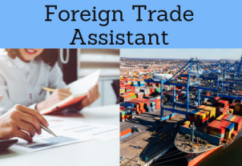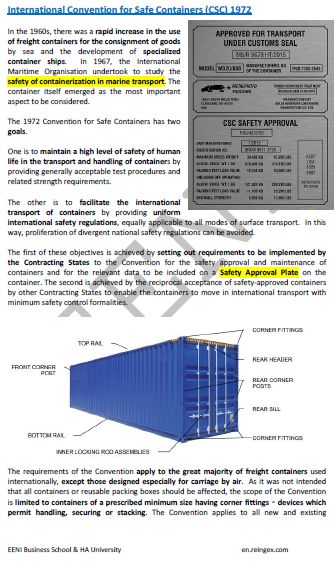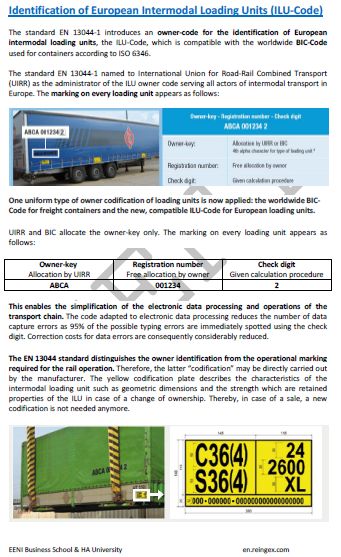Convention for Safe Containers (CSC)

Safety Approval Plate (Convention for Safe Containers) Transport
- Introduction to the International Convention for Safe Container (CSC) 1972, International Maritime Organization (IMO)
- Analysis of the International Convention for Safe Containers
- Safety Approval Plate on the container

The Subject “International Convention for Safe Containers” belongs to the following Online Programs taught by EENI Global Business School:
Logistics Courses: International Transport, Maritime Transport, Multimodal, Road, Rail, Air, Transport in Africa.

Course: Foreign Trade Assistant.

Diplomas: Foreign Trade, International Transport.

Masters: International Transport, Transport in Africa, International Business, Foreign Trade.
Doctorate: Global Logistics, World Trade.
Languages: 
 Convenio seguridad de los contenedores (CSC)
Convenio seguridad de los contenedores (CSC)  Convention internationale sur la sécurité des conteneurs
Convention internationale sur la sécurité des conteneurs  Convenção relativa à Seguridade dos Contentores.
Convenção relativa à Seguridade dos Contentores.
Sample - International Convention for Safe Containers:

International Convention for Safe Containers (CSC) 1972:
- Adoption: December 2, 1972
- Entry into force: September 6, 1977
Objectives of the International Convention for Safe Containers (CSC):
- To grant the safety of workers in transport and container movement, through the implementation of testing procedures.
- One measure that guarantees security is the obligation to include the security approval plate on the container
- To facilitate the international container transport and logistics through the uniform international safety standards
Containers designed for the Air transport are not included in the International Convention for Safe Containers (CSC).
ILU Code (Road-Rail Combined Transport).
Source: International Bureau of Containers and Intermodal Transport


- Istanbul Convention
- Customs Convention on Containers
- TIR Convention
- International Road Transport Union (IRU)
- Safe Load Securing for Road Transport
- International Union of Railways
- International Chamber of Shipping
- IATA
- BIC (Containers)
- International Civil Aviation Organization (ICAO, Chicago Convention)
(c) EENI Global Business School (1995-2024)
We do not use cookies
Top of this page



